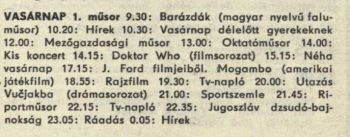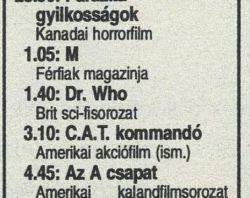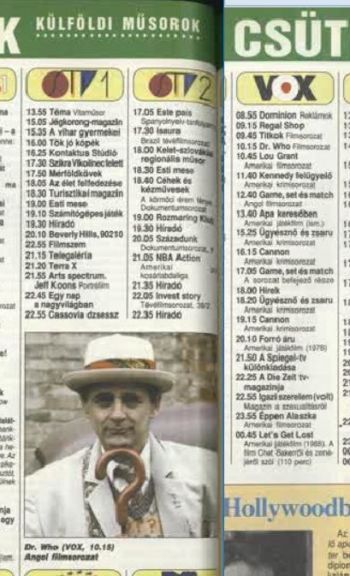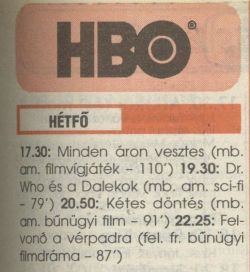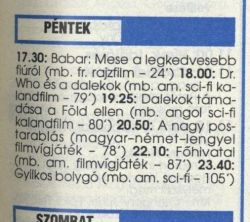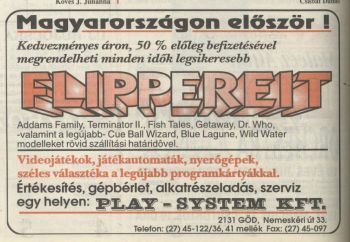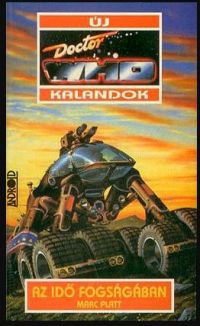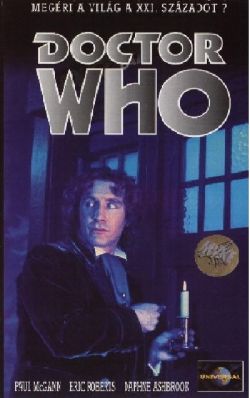Difference between revisions of "Hungary"
Jon Preddle (talk | contribs) |
Jon Preddle (talk | contribs) |
||
| (11 intermediate revisions by the same user not shown) | |||
| Line 1: | Line 1: | ||
| + | {{TOC right}} | ||
| + | '''Doctor Who''' has not been shown on terrestrial television in '''[[wikipedia:Hungary|HUNGARY]]''', but signals from [[Yugoslavia]] could be received when it was seen there in '''1986''', and the [[Germany|German]] stations '''RTL-Plus''' and '''VOX''' were also available - listings for these stations were published in the Hungarian magazine ''Radio es Televizioijjsag (RTV)''. | ||
| − | {{ | + | {{Image table |
| − | + | |[[File:YugoHungary.JPG|right|thumb|350px|Yugoslavian TV was available in Hungary (Doctor Who was on in 1986)]]|[[File:TRLHungary.JPG|right|thumb|250px|German station RTL-Plus was available in Hungary (generic listing from RTV in 1993)]]|[[File:VOXHungary.JPG|right|thumb|350px|German station Vox was available in Hungary (generic listing from RTV in 1995)]] | |
| + | }} | ||
| + | {{clear}} | ||
| − | '''Doctor Who''' | + | '''Doctor Who''' could also be seen (in English) on [[Super Channel]] in the late '''1980s''', and on [[BBC World Service Television Europe|BBC World Service Television]] in '''1992, 1993''' and '''1994''', and on [[BBC Prime]] from '''1995'''. |
The [[New Series]] was shown from '''2006''', with the title '''"Ki Vagy, Doki?"''' ("Who Are You, Doctor?"). | The [[New Series]] was shown from '''2006''', with the title '''"Ki Vagy, Doki?"''' ("Who Are You, Doctor?"). | ||
| − | + | '''Doctor Who''' was also available in other forms: | |
| + | |||
| + | |||
| + | ==[[Peter Cushing]] and the Daleks== | ||
| + | |||
| + | It's unknown whether the Dalek movies were shown in cinemas. We searched various archived newspapers online, but could not find any mention of them in the 1960s, 70s or 80s, but they did play on Hungarian television in the late 1970s and again in the early 1990s. | ||
| + | Both films were available to see in '''May 1979''' (the TV station is not known; it was either a local channel or one from a neighbouring country). The first was billed simply as '''"Dr Who"''' and the sequel as '''"A Dalekok Inváziója 2150"''' (''The Daleks Invade in 2150''), a slightly different title to that which it was later known - see below. | ||
| − | |||
| − | The | + | Both were later shown on the first-ever European '''[[Wikipedia:HBO Europe|HBO]]''' channel, which was launched in Hungary on 28 September 1991. (The channel later became '''HBO Central Europe''' when other countries - such as [[Czech Republic]] - joined the group a few years later.) |
| − | + | ||
| + | The first film - with the basic title '''"Dr Who és a Dalekok"''' - was shown on HBO on Monday, '''29 March 1993''' at 5.30pm, and again five days later on Saturday, '''3 April 1993''' (6.30pm). The movie was repeated two more times, on Thursday, '''13 April 1993''' (at 5.30pm) and Friday '''11 June 1993''' (at 6pm). | ||
| + | |||
| + | Also on '''11 June''' was the sequel billed under a title different to that used in 1979 (above) - '''"Dalekok Támadása a Föld Ellen"''' (''Daleks Attack Against the Earth'') - following at 7.25pm. The second film was shown again on its own on '''17 June 1993''' at 6pm, then again the following week on '''24 June''' at 12.05am. | ||
| + | |||
| + | {{Image table | ||
| + | |[[File:DWATDHungary1993.JPG|right|thumb|250px|Dr Who and the Daleks, on HBO Europe, 29 March 1993]]|[[File:DaleksHungary1993.JPG|right|thumb|250px|Both Daleks movies aired together on HBO Europe, 11 April 1993]] | ||
| + | }} | ||
| + | {{clear}} | ||
| + | NOTE: The '''"mb"''' notation in the newspaper listings stands for "magyarul beszélő" (Hungarian Voice), which ''usually'' indicates that a film is dubbed. (The other notation "fel" (for "feliratos") is used when films had subtitles.) However, some films shown on Hungarian TV were instead "narrated" by a single voice speaking over the original dialogue (similar to "lektor" used in [[Poland]]); the short-form "mb" may have also been used for those. | ||
| + | |||
| + | So it's not clear which 'translation' method was used for the films. Neither is listed in the Hungarian Dubbing site (see link in the Video section below), which does suggest they weren't dubbed. (It's highly doubtful HBO would have funded new dubs themselves.) | ||
| + | |||
| + | If HBO acquired pre-dubbed prints, we could find no evidence of the films having been shown in cinemas in the 60s or 70s, or on TV prior to 1993. | ||
| + | |||
| + | Both films were shown again by HBO the following year: '''"Dalekok Támadása…"''' on '''19 February 1994''', at 6.30pm, and '''"Dr Who és a Dalekok"''' on '''12 March 1994''' (6.30pm). | ||
| + | |||
| + | ==Merchandise== | ||
| + | [[File:HungaryPinball ad.JPG|right|thumb|350px|The Doctor Who "Flippereit" pinball game was available in Hungary]] | ||
| − | ''' | + | Some Hungarian newspapers in mid-1993 had print ads for '''"Flippereit"''', which are Pinball machines. Included in the list of game titles is the one for '''"Dr Who"'''. |
| − | ==Books== | + | ===Books=== |
| − | In January 1993, Android published a translated edition of Marc Platt's seventh Doctor '''New Adventures''' novel '''Cat's Cradle: Time's Crucible''' under the title '''Új Doctor Who Kalandok: Az Idö Fogságában''', which translates as ''New Doctor Who Adventures: Captured by Time'' / ''Captured in Time''. | + | In '''January 1993''', Android published a translated edition of Marc Platt's seventh Doctor '''New Adventures''' novel '''Cat's Cradle: Time's Crucible''' under the title '''Új Doctor Who Kalandok: Az Idö Fogságában''', which translates as ''New Doctor Who Adventures: Captured by Time'' / ''Captured in Time''. |
The back cover says episodes were currently screening on satellite (presumably those on [[BBC World Service Television Europe]]), but more curiously, the spine of the book has the number '''1''' on it, and the back blurb says that further books would be published on a two-monthly basis "next year". It's likely this refers simply to the arrival of the "Missing Adventures" series of books, which first appeared in the UK from July 1994 -- but the "1" does suggest that Android intended to - but ultimately didn't - publish further titles. | The back cover says episodes were currently screening on satellite (presumably those on [[BBC World Service Television Europe]]), but more curiously, the spine of the book has the number '''1''' on it, and the back blurb says that further books would be published on a two-monthly basis "next year". It's likely this refers simply to the arrival of the "Missing Adventures" series of books, which first appeared in the UK from July 1994 -- but the "1" does suggest that Android intended to - but ultimately didn't - publish further titles. | ||
| Line 32: | Line 59: | ||
*'''[[Shada|SHADA]]''' (in November 2013) | *'''[[Shada|SHADA]]''' (in November 2013) | ||
*'''A HALÁL VÁROSA''' ([[City of Death]]) (November 2015) | *'''A HALÁL VÁROSA''' ([[City of Death]]) (November 2015) | ||
| + | [[File:TVM VHS Hungary 3.jpg|right|thumb|250px|Hungarian VHS tape]] | ||
Translated editions of various [[New Series]] and '''Torchwood''' books were also published by Gabo. | Translated editions of various [[New Series]] and '''Torchwood''' books were also published by Gabo. | ||
| + | |||
| + | |||
| + | ===Video=== | ||
| + | The 1996 [[TV Movie]] was released on rental VHS by MCA/Universal/CIC Video and [https://hu.wikipedia.org/wiki/UIP-Dunafilm UIP / Dunafilm] in '''1997''': the cover tagline reads '''MEGÉRI A VILÁG A XXI SZÁZADOT?''' (''Will the World Survive into the 21st Century?''). | ||
| + | |||
| + | The dubbed soundtrack was recorded at Videovox Studio Ltd; both Sylvester McCoy and Paul McGann were voiced by '''Péter Haás Vander'''. All the other voice-artists are named in the Hungarian Dubbing site: | ||
| + | *[http://iszdb.hu/?audio=8862 TV Movie dubbing artists] | ||
| Line 45: | Line 80: | ||
==Hungary in Doctor Who== | ==Hungary in Doctor Who== | ||
*Henric Hirsch, the director of (most of) [[The Reign of Terror]], was Hungarian. | *Henric Hirsch, the director of (most of) [[The Reign of Terror]], was Hungarian. | ||
| + | *Gabor Baraker (Wang-Lo in [[Marco Polo]] and Luigi Ferrigo in [[The Crusade]]) was born in Budapest. | ||
| + | *Harry Houdini (real name Erik Weisz) was born in Budapest (Ben mentions Houdini in [[The Highlanders]]; the Doctor claims to have met him in [[Planet of the Spiders]] and [[Revenge of the Cybermen]]). | ||
*Salamander's base was in Hungary; the Eperjes-Tokaj ranges erupted ([[The Enemy of the World]]). | *Salamander's base was in Hungary; the Eperjes-Tokaj ranges erupted ([[The Enemy of the World]]). | ||
*Austro-Hungarian troops were fighting in [[The War Games]]. | *Austro-Hungarian troops were fighting in [[The War Games]]. | ||
| + | *Catherine Schell (the Countess in [[City of Death]]) was born in Budapest. | ||
[[Category:Europe]] | [[Category:Europe]] | ||
Latest revision as of 03:12, 3 March 2024
Doctor Who has not been shown on terrestrial television in HUNGARY, but signals from Yugoslavia could be received when it was seen there in 1986, and the German stations RTL-Plus and VOX were also available - listings for these stations were published in the Hungarian magazine Radio es Televizioijjsag (RTV).
Doctor Who could also be seen (in English) on Super Channel in the late 1980s, and on BBC World Service Television in 1992, 1993 and 1994, and on BBC Prime from 1995.
The New Series was shown from 2006, with the title "Ki Vagy, Doki?" ("Who Are You, Doctor?").
Doctor Who was also available in other forms:
Peter Cushing and the Daleks
It's unknown whether the Dalek movies were shown in cinemas. We searched various archived newspapers online, but could not find any mention of them in the 1960s, 70s or 80s, but they did play on Hungarian television in the late 1970s and again in the early 1990s.
Both films were available to see in May 1979 (the TV station is not known; it was either a local channel or one from a neighbouring country). The first was billed simply as "Dr Who" and the sequel as "A Dalekok Inváziója 2150" (The Daleks Invade in 2150), a slightly different title to that which it was later known - see below.
Both were later shown on the first-ever European HBO channel, which was launched in Hungary on 28 September 1991. (The channel later became HBO Central Europe when other countries - such as Czech Republic - joined the group a few years later.)
The first film - with the basic title "Dr Who és a Dalekok" - was shown on HBO on Monday, 29 March 1993 at 5.30pm, and again five days later on Saturday, 3 April 1993 (6.30pm). The movie was repeated two more times, on Thursday, 13 April 1993 (at 5.30pm) and Friday 11 June 1993 (at 6pm).
Also on 11 June was the sequel billed under a title different to that used in 1979 (above) - "Dalekok Támadása a Föld Ellen" (Daleks Attack Against the Earth) - following at 7.25pm. The second film was shown again on its own on 17 June 1993 at 6pm, then again the following week on 24 June at 12.05am.
NOTE: The "mb" notation in the newspaper listings stands for "magyarul beszélő" (Hungarian Voice), which usually indicates that a film is dubbed. (The other notation "fel" (for "feliratos") is used when films had subtitles.) However, some films shown on Hungarian TV were instead "narrated" by a single voice speaking over the original dialogue (similar to "lektor" used in Poland); the short-form "mb" may have also been used for those.
So it's not clear which 'translation' method was used for the films. Neither is listed in the Hungarian Dubbing site (see link in the Video section below), which does suggest they weren't dubbed. (It's highly doubtful HBO would have funded new dubs themselves.)
If HBO acquired pre-dubbed prints, we could find no evidence of the films having been shown in cinemas in the 60s or 70s, or on TV prior to 1993.
Both films were shown again by HBO the following year: "Dalekok Támadása…" on 19 February 1994, at 6.30pm, and "Dr Who és a Dalekok" on 12 March 1994 (6.30pm).
Merchandise
Some Hungarian newspapers in mid-1993 had print ads for "Flippereit", which are Pinball machines. Included in the list of game titles is the one for "Dr Who".
Books
In January 1993, Android published a translated edition of Marc Platt's seventh Doctor New Adventures novel Cat's Cradle: Time's Crucible under the title Új Doctor Who Kalandok: Az Idö Fogságában, which translates as New Doctor Who Adventures: Captured by Time / Captured in Time.
The back cover says episodes were currently screening on satellite (presumably those on BBC World Service Television Europe), but more curiously, the spine of the book has the number 1 on it, and the back blurb says that further books would be published on a two-monthly basis "next year". It's likely this refers simply to the arrival of the "Missing Adventures" series of books, which first appeared in the UK from July 1994 -- but the "1" does suggest that Android intended to - but ultimately didn't - publish further titles.
(The cover artwork painted by Tim White was not a new piece, and had previously appeared on a 1978 printing of Frank Herbert's 1968 novel "The Santaroga Barrier"!)
Gabo published two of the new novelisations based on Douglas Adams scripts:
- SHADA (in November 2013)
- A HALÁL VÁROSA (City of Death) (November 2015)
Translated editions of various New Series and Torchwood books were also published by Gabo.
Video
The 1996 TV Movie was released on rental VHS by MCA/Universal/CIC Video and UIP / Dunafilm in 1997: the cover tagline reads MEGÉRI A VILÁG A XXI SZÁZADOT? (Will the World Survive into the 21st Century?).
The dubbed soundtrack was recorded at Videovox Studio Ltd; both Sylvester McCoy and Paul McGann were voiced by Péter Haás Vander. All the other voice-artists are named in the Hungarian Dubbing site:
External Links
Hungary in Doctor Who
- Henric Hirsch, the director of (most of) The Reign of Terror, was Hungarian.
- Gabor Baraker (Wang-Lo in Marco Polo and Luigi Ferrigo in The Crusade) was born in Budapest.
- Harry Houdini (real name Erik Weisz) was born in Budapest (Ben mentions Houdini in The Highlanders; the Doctor claims to have met him in Planet of the Spiders and Revenge of the Cybermen).
- Salamander's base was in Hungary; the Eperjes-Tokaj ranges erupted (The Enemy of the World).
- Austro-Hungarian troops were fighting in The War Games.
- Catherine Schell (the Countess in City of Death) was born in Budapest.
